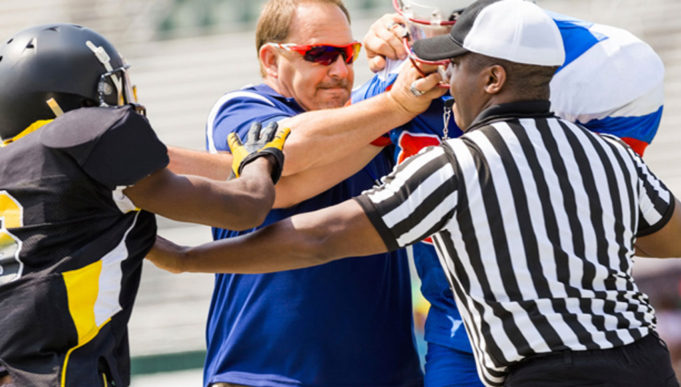What do a ninth-inning call at home plate, a crucial roughing penalty late in the fourth quarter or a block/charge call all have in common? They are all tough calls that can generate conflict, controversy and a coach who is going to be very upset.
All officials have experienced conflict with a coach. Confrontations can have positive outcomes if the official follows the basic principles of conflict resolution management.
Being in the proper position to make the call and knowing the applicable rule are prerequisites to successfully selling the tough call. What if the head coach doesn’t notice or care? Fight or flight may seem like good options, but neither works. A better alternative is to apply conflict resolution management.
By practicing three easy steps, the outcomes of those confrontations can be quickly and successfully resolved.
Step one
Listen to the nature of the complaint. Let the coach disclose his or her feelings or vent frustration with your call. Do not interrupt while the coach is voicing an opinion about your call.
Nonverbal communication skills, including body language, can dramatically help sell the call. Make eye contact with the coach while he or she is talking. Keep your arms behind your back or at your sides, never crossed in front of your chest since that suggests you are guarded. Do not roll your eyes. Nodding, with one hand up to your chin, shows you value and acknowledge the coach’s opinion with a willingness to listen to his or her point of view.
Step two
Acknowledge that you understand and empathize with his or her position. Let the coach know you understand the nature of the complaint while responding to concerns. Answer questions and identify or analyze unclear issues. Speak in a tone that is conversational. Enunciate and articulate so the coach will understand that you are in control of the situation.
Hand gestures may be used, but never point your finger at or physically touch the coach. Use some of the coach’s words when responding to show that you have been listening.
Step three
Resolve the conflict by initiating a course of action that is both timely and fair. You cannot allow the coach’s complaint to impede the progress of the game or undermine your control of the situation.
You may thank the coach for voicing a concern, then emphasize that it is time to get back to playing the game. Use a positive, upbeat tone of voice with proper voice inflection and voice quality. Your voice energy should demonstrate enthusiasm, your rate of speech should be fast enough so the coach knows you are ready to move on, and your pitch should be direct, smooth and pleasant. As long as there are athletic contests between competitive teams, coached by competitive people and officiated by human beings, there will be opportunities for conflict.
By following the three-step approach, your tough calls will still be tough, but you will have the tools to successfully overcome your next coach’s challenge. Selling the tough call becomes almost as important as making the tough call. Using both verbal and nonverbal skills will dramatically improve your success rate.
What's Your Call? Leave a Comment:
Note: This article is archival in nature. Rules, interpretations, mechanics, philosophies and other information may or may not be correct for the current year.
This article is the copyright of ©Referee Enterprises, Inc., and may not be republished in whole or in part online, in print or in any capacity without expressed written permission from Referee. The article is made available for educational use by individuals.
















